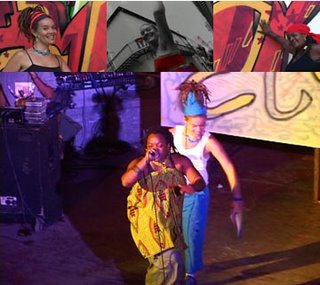Welcome CinéFemme Back to Paris and Cineffable!
 After a summer hiatus....
After a summer hiatus....I AM BACK.
With Cineffable News!
From Greencine
November 06, 2006

Paris Dispatch.
Moira Sullivan looks back on a Parisian highlight which took place October 27 through 30.
The Paris Cineffable Feminist and Lesbian Festival is a pearl of a festival, an international "non-mixte" event exclusively for women. Since 1989, it has been held during what can be seen as the (unsuccessful) attempt to bring Halloween to France and just before la Toussaint (All Saints Day). This year the 18th edition took place at the legendary Trianon Theatre, built in the late 19th century and a former venue for Jacques Brel, and at the folklore museum Halle Saint Pierre, both situated just below the Sacré Coeur. The Trianon conveniently accommodates everyone who buys an adhésion or membership fee for €8, and the entire program of nearly 80 films can be seen for €45. Attendance is up 23 percent over last year, so there will most certainly be a 19th edition. The festival also features several "non-mixte" film events during rest of the year in Paris. Run by approximately 50 volunteers, Cineffable is sponsored in part by the city of Paris and one of its best and most eclectic radio stations, Radio Nova. This year's trailer featured a smart collage set to Brigitte Bardot's 1967 classic "Harley Davidson."
Cineffable's success is partly attributable to the vision of the selection committee, which culled the 7000 short films submitted to come up with an excellent package featuring the best in lesbian global cinema. The committee regularly travels San Francisco's LGBT festival, Frameline, and maintains contact with many other gay and lesbian film festivals around the world. While all the films need to be translated into French, the team as a whole is fluent in six languages. The program includes a screenwriting award with support for production and features debates at Halle Saint Pierre. This year there were discussions on same sex parenting, racism and discrimination; eleven photographers, engravers, sculptors, poets and writers discussed and displayed their work; and there was a presentation from the French group, Slam O'Féminin. Modeled to some extent on Créteil Films de Femmes, Cineffable weaves political activism with eroticism, poignant stories with humor.
Besides a concert by Nawal, a vocalist from the Comores archipelago in the Indian Ocean, opening night featured The Journey, the story two young upper class Indian women who attend a private school in a small village and later fall in love. This brings problems to Kiran, as Delilah will soon enter into an arranged marriage. Filmmaker Ligy J Pullappally was born in India, grew up in Chicago, became a lawyer and then returned to India to make this film. Several other directors represented at the festival seem to be living in countries other than their homelands as well.
 Slam poetry was one of the main themes of the films of this festival. The audience award for best short documentary went to Krudas, a film on Cuban lesbian rappers beautifully executed by Sandra Boero-Imwinkelried from Argentina who studied cinema at the University of Cordoba. Left Lane, by Samantha Farinella, founder of One Angry Woman Productions, won the award for best feature documentary. The doc, not as brilliant as Boero-Imwinkelried's, follows a year on the road with Alix Olson, a spoken word poet.
Slam poetry was one of the main themes of the films of this festival. The audience award for best short documentary went to Krudas, a film on Cuban lesbian rappers beautifully executed by Sandra Boero-Imwinkelried from Argentina who studied cinema at the University of Cordoba. Left Lane, by Samantha Farinella, founder of One Angry Woman Productions, won the award for best feature documentary. The doc, not as brilliant as Boero-Imwinkelried's, follows a year on the road with Alix Olson, a spoken word poet.The theme same sex marriage was evident in other recent work. In The Attack of the Bride Monster by Vicky Boone, a woman uses all of her energy to convince her partner to marry her. The same theme is explored in Floored by Love by Desiree Lim, who grew up in Malaysia and Japan and now works in Canada. Two Asian-Canadian partners, one from Japan and the other from China, want to tell their parents about their relationship and their plans to marry. Meanwhile, their Jewish neighbors have a son who is just coming out.
Two feature films that won prizes at the Créteil festival last spring were featured at Cineffable this year. Both is a compelling drama that explores the life of a bisexual stuntwoman. San Francisco-based and Peruvian-born Lisset Barcellos directed the feature. The other film, Sévigné by Marta Balletbò-Coll, is about a famous theater director who falls in a love with a playwright. It stars Anna Azcona as well as the director herself.
The audience award for best feature film was tied between Sévigné and Fremde Haut (Unveiled) by Angelina Maccarone from Italy, a film about an Iranian woman who is forced to take on the identity of a deceased man in order to survive in Germany. As the festival wrapped, several French spoken word poets performed, followed by the presentation of "the best of the 18th," featuring several short films. The fabulous "Cineffablians" are planning a gala festival to commemorate the 20th edition with a Greek theme.
Edited by David Hudson, Greencine


Comments